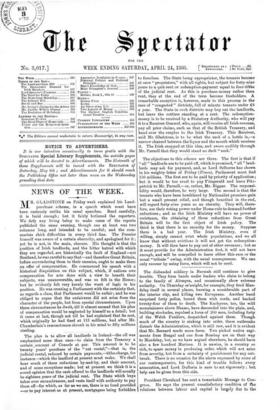The plan is to allow all landlords in Ireland—the all
was emphasised more than once—to claim from the Treasury a certain amount of Consols at par. This amount is to be twenty years' purchase of the "net rental,"—that is, the judicial rental, reduced by certain payments,—tithe-charge, for instance—which the landlord at present must make. We shall hear much of these reductions by-and-by, and their amount, and of some exceptions made ; but at present we think it is a sound opinion that the cash offered to the landlords will usually be eighteen years of the judicial rent. The State which buys takes over eneumbiances, and vests itself with authority to pay them off—for which, as far as we see, there is no fend provided —or to pay interest as at present, mortgagees being forbidden to foreclose. The State being expropriator, the tenants become at once " proprietors," with all rights, but subject for forty-nine years to a quit-rent or redemption-payment equal to four-fifths of the judicial rent. As this is purchase-money rather than rent, they at the end of the term become freeholders. A remarkable exception is, however, made to this process in the case of `congested" districts, full of minute tenants ander £4 a year. The State in such districts may buy out the landlords, but leave the cottiers standing at a rent. The redemption- money is to be received by a Statutory Authority, who will pay it to a Receiver-General, who, again, will receive all Irish revenue, pay all prior claims, such as that of the British Treasury, and hand over the surplus to the Irish Treasury. This Receiver, said Mr. Gladstone, is to be what the neck of a bottle is,—a narrow channel between the liquor and the mouth which receives it. The Irish snapped at this idea, and swore audibly through Mr. Parnell that they would stand no g'uch " neck."


































